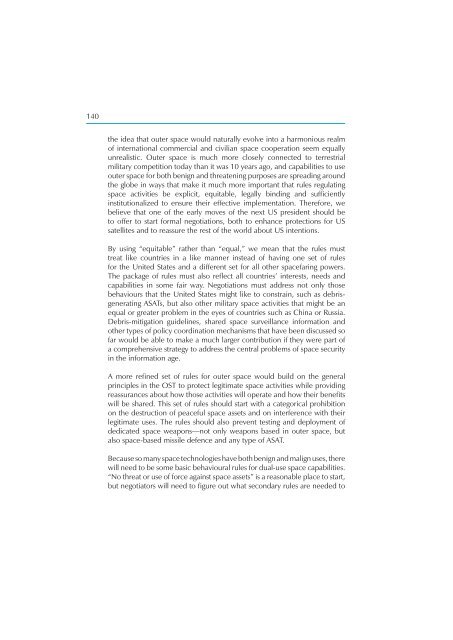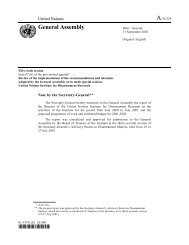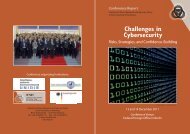Security in Space The Next Generation - UNIDIR
Security in Space The Next Generation - UNIDIR
Security in Space The Next Generation - UNIDIR
You also want an ePaper? Increase the reach of your titles
YUMPU automatically turns print PDFs into web optimized ePapers that Google loves.
140<br />
the idea that outer space would naturally evolve <strong>in</strong>to a harmonious realm<br />
of <strong>in</strong>ternational commercial and civilian space cooperation seem equally<br />
unrealistic. Outer space is much more closely connected to terrestrial<br />
military competition today than it was 10 years ago, and capabilities to use<br />
outer space for both benign and threaten<strong>in</strong>g purposes are spread<strong>in</strong>g around<br />
the globe <strong>in</strong> ways that make it much more important that rules regulat<strong>in</strong>g<br />
space activities be explicit, equitable, legally b<strong>in</strong>d<strong>in</strong>g and suffi ciently<br />
<strong>in</strong>stitutionalized to ensure their effective implementation. <strong>The</strong>refore, we<br />
believe that one of the early moves of the next US president should be<br />
to offer to start formal negotiations, both to enhance protections for US<br />
satellites and to reassure the rest of the world about US <strong>in</strong>tentions.<br />
By us<strong>in</strong>g “equitable” rather than “equal,” we mean that the rules must<br />
treat like countries <strong>in</strong> a like manner <strong>in</strong>stead of hav<strong>in</strong>g one set of rules<br />
for the United States and a different set for all other spacefar<strong>in</strong>g powers.<br />
<strong>The</strong> package of rules must also refl ect all countries’ <strong>in</strong>terests, needs and<br />
capabilities <strong>in</strong> some fair way. Negotiations must address not only those<br />
behaviours that the United States might like to constra<strong>in</strong>, such as debrisgenerat<strong>in</strong>g<br />
ASATs, but also other military space activities that might be an<br />
equal or greater problem <strong>in</strong> the eyes of countries such as Ch<strong>in</strong>a or Russia.<br />
Debris-mitigation guidel<strong>in</strong>es, shared space surveillance <strong>in</strong>formation and<br />
other types of policy coord<strong>in</strong>ation mechanisms that have been discussed so<br />
far would be able to make a much larger contribution if they were part of<br />
a comprehensive strategy to address the central problems of space security<br />
<strong>in</strong> the <strong>in</strong>formation age.<br />
A more refi ned set of rules for outer space would build on the general<br />
pr<strong>in</strong>ciples <strong>in</strong> the OST to protect legitimate space activities while provid<strong>in</strong>g<br />
reassurances about how those activities will operate and how their benefi ts<br />
will be shared. This set of rules should start with a categorical prohibition<br />
on the destruction of peaceful space assets and on <strong>in</strong>terference with their<br />
legitimate uses. <strong>The</strong> rules should also prevent test<strong>in</strong>g and deployment of<br />
dedicated space weapons—not only weapons based <strong>in</strong> outer space, but<br />
also space-based missile defence and any type of ASAT.<br />
Because so many space technologies have both benign and malign uses, there<br />
will need to be some basic behavioural rules for dual-use space capabilities.<br />
“No threat or use of force aga<strong>in</strong>st space assets” is a reasonable place to start,<br />
but negotiators will need to fi gure out what secondary rules are needed to








